How backpacking towns are coping after being left empty by coronavirus
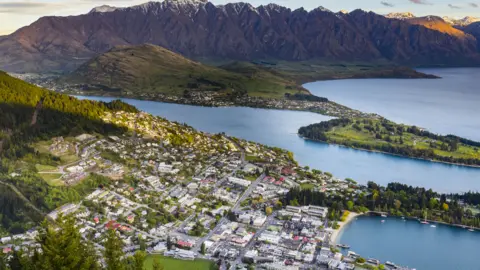 Getty Images
Getty ImagesFor some it's to skydive, others it's to find themselves, but for Tara Bashford it was her love of mountains that made her book a backpacking trip to New Zealand.
The 23-year-old climbing instructor from Liverpool had "saved up as much as possible" with her fiancé after recovering from a kidney transplant.
"I love the spontaneity of backpacking," she tells Radio 1 Newsbeat. "I don't make that much of a plan and just go with the flow."
But Covid-19 changed things.
Tara was supposed to fly to New Zealand in April but, after closing its borders, New Zealand's prime minister has said it won't open up to global travellers for "a long time to come".
The European Union has insisted there will be a summer season this year, but for more remote places it'll be harder for them to recover.
There's a proposed 'travel bubble' - a quarantine-free flow of people between Australia and New Zealand - which business owners hope will be "the seeds for businesses to survive".
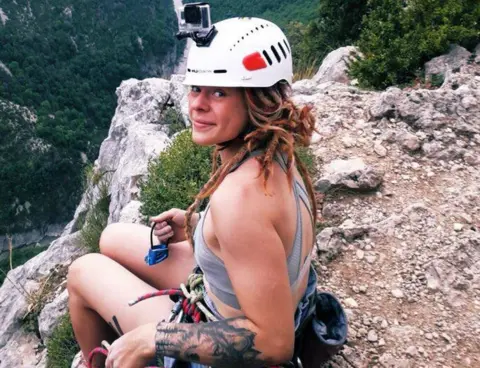 Tara Bashford
Tara BashfordMore than half of Queenstown's 28,000 population are employed in the tourism sector - with around two million international visitors each year contributing NZD$2.4bn (£1.2bn) to the local economy.
"Right now we're not even close to breaking even," Brett Duncan - who owns the two Adventure hostels in the town - tells Newsbeat.
"It's expensive to run a business here. Our break-even point at full rates is 71% occupancy and I've now closed one hostel and the other I have at 40% occupancy with discounted rates".
He says the coronavirus pandemic has "decimated" the industry and as Queenstown is "so heavily reliant" on tourism it's been hit harder than others.
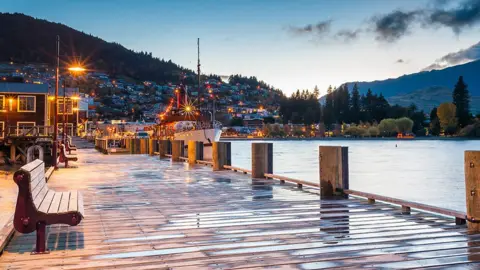 Getty Images
Getty Images"We've now got a disproportionate amount of bars and restaurants to the people who live here," Brett explains.
"We're going to see a lot of casualties here and a lot of businesses will close," he believes.
Brett hopes "it'll only be 12 months of real pain" but is mindful that the accommodation sector - especially hostels - "won't bounce back with domestic tourism" and he's likely to continue to lose money until 2021.
The UK Foreign Office currently advises British nationals against all but essential international travel, meaning backpackers like Tara will have to postpone their trips indefinitely.
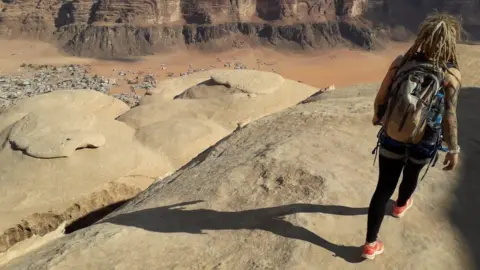 Tara Bashford
Tara BashfordAs well as her trip to New Zealand Tara has a one-way flight to Australia booked for October and has plans to travel the world with her fiancé for 12 months.
Instead of travelling, Tara has been spending the majority of her time at home, as she's one of the 2.5 million people most at risk of catching coronavirus.
"On the day we were supposed to fly to New Zealand I was pretty devastated," she explains.
"You just watch each plan get cancelled and postponed. We were supposed to get married this year and that's not going to happen either."
While international travel is paused, there's now a push for domestic tourists to visit Queenstown - but for destinations on backpacking routes in other parts of the world it's not as simple.
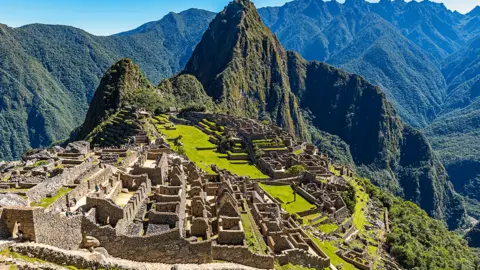 Getty Images
Getty ImagesVisitors to Machu Picchu - one of the new seven wonders of the world - have to pass through Cusco, in southern Peru, but "nobody's taking reservations".
"Normally we would be coming into our high season now," explains Irishman Christopher Doyle, who moved to the city and is general manager of Wild Rover - a popular bar and hostel for backpackers.
"We're down to bare bones of staff now and we employed all locals. The only foreigner working here was me."
"We have to take baby steps but our worst case scenario is tourists don't come back to Peru in those numbers," he tells Newsbeat.
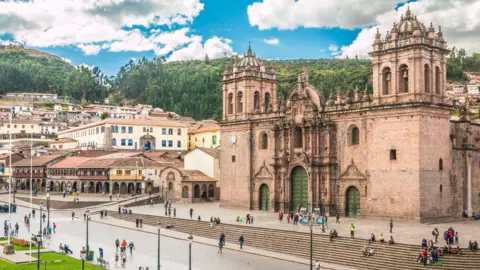 Getty Images
Getty Images"Landmarks like Machu Picchu and Rainbow Mountain need to reopen first," Christopher says.
"That's to get to just some form of normality."
'I'm really scared'
Nearly 10 thousand miles away in Sri Lanka's Arugam Bay locals were hoping this season would be the start of their "normal" following a huge dip in tourist numbers in the aftermath of the country's terror attacks last Easter.
"I'm really scared about this," explains Ayathu Pichai Mubarak - who prefers to go by his surf instructor name of Muba.
"We're waiting for the tourists to come back. I've had no business in three months and I've had to borrow money from friends but I need to pay them back some day."
Allow Instagram content?

Muba says most of the population in the area - popular with backpackers who want to take up surfing - work in hotels or are Tuk Tuk drivers and that tourists "help us all earn money".
The 26-year-old says he earns up to US$100 (£80) a day teaching "from sunrise to sunset" but he's now uncertain about the future.
"Last year people were afraid to visit Sri Lanka but now with coronavirus they can't come," Muba tells Newsbeat.
"I'm talking with my friends about how we're going to survive if tourists don't return."


